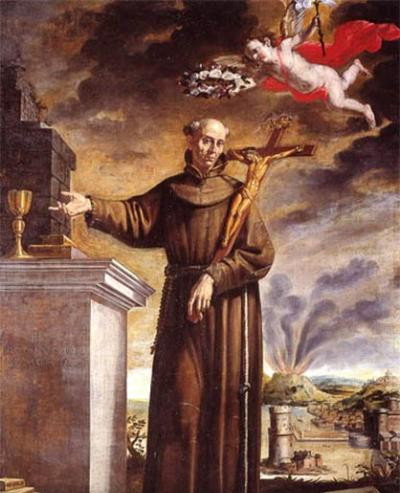
Saint of the Day November 28: St. James of the Marches
St. James of the Marches: Life and Impact of the Franciscan Saint in Church History
Name
Domenico Gangala
Title
Religious and priest
Birth
Sept. 01, 1393, Monteprandone, Ascoli Piceno
Death
November 28, 1476, Naples
Recurrence
28 November
Beatification
August 12, 1624, Rome, Pope Urban VIII
Canonization
December 10, 1726, Rome, Pope Benedict XIII
Prayer
O glorious St. James, to you we turn in this time of need and suffering. Do not deny your intercession to us poor sinners and obtain for us from Jesus the grace that is so dear to our hearts. Grant that we may walk after your examples: make us sensitive to the Word of God, tear down our idolatries, eradicate hatred from our hearts, destroy all the germs of selfishness and sin; that the virtues of goodness, love toward all and authentic holiness may flourish in us also. In praise of the Holy Trinity. Amen.
Patron Saint of
Napoli, Monteprandone
Protector of
Children
Roman Martyrology
At Nàpoli, in Campània, the deposition of Saint Giàcomo della Marca, Priest of the Order of the Minorites and Confessor, illustrious for the austerity of his life, for his apostolic preaching and for many legations accomplished for the benefit of Christendom. By the Supreme Pontiff Benedict the tenth he was ascribed to the catalog of Saints.
The Saint and Mission
St. James of the Marches, a 15th-century Franciscan saint, provides a vivid example of how Christian mission can be embodied through the life of an individual. His missionary commitment was deeply rooted in Franciscan spirituality, characterized by humility, poverty and an ardent desire to spread the Gospel. St. James’ mission was multifaceted. He was a tireless preacher, traveling across Europe to proclaim the Christian message. His preaching was powerful and direct, aimed at renewing faith and stimulating conversion of heart. This aspect of his mission reflects the importance of word and teaching in spreading the faith. In addition to preaching, St. James devoted himself to the ministry of reconciliation. At a time marked by divisions and conflicts, both religious and civil, he worked tirelessly to promote peace and reconciliation between the conflicting parties. This aspect of his work highlights the Christian mission as a commitment to justice, peace and the healing of divisions in society. Another key aspect of his mission was attention to the needy and marginalized. Following the example of St. Francis of Assisi, St. James devoted a significant part of his ministry to the service of the poor, thus bearing witness to Christ’s preferential love for the least in society. The life of St. James of the Marches teaches us that Christian mission is expressed through a variety of modalities: from preaching and teaching, to promoting peace and justice, to direct service to those most in need. His legacy is a powerful reminder of the universal call of every Christian to be a missionary, not only in words, but also through concrete actions that bear witness to Christ’s love for the world.
The Saint and Mercy
St. James of the Marches, a 15th-century Franciscan friar, is an emblematic figure who embodies mercy in the Christian tradition. His life, marked by deep humility and dedication to the service of others, reflects the essence of mercy as a central virtue in Christian life. St. James was known for his fervor in preaching and the ministry of reconciliation. His mission was rooted in a deep desire to offer God’s forgiveness and mercy to people, especially those on the margins of society. He traveled through many regions, devoting himself to preaching the Gospel and offering the sacrament of confession, through which many people experienced spiritual renewal and divine mercy. His approach to ministry was characterized by genuine compassion and understanding of the difficulties and challenges faced by people in their daily lives. This sensitivity enabled him to touch the lives of many, offering hope and comfort through his words and actions. St. James understood that mercy was not just a theological concept, but a practical reality that had to be lived and shared. Moreover, his dedication to the poor and marginalized showed a tangible mercy that went beyond words. He did not just preach mercy; he embodied it in his daily service, thus becoming a living model of Christ’s merciful love. The life of St. James of the Marches reminds us that mercy is at the heart of the Christian mission. His legacy inspires us to live with deep compassion and to seek concrete ways to exercise mercy in our world. His story is an invitation to reflect on how we can be instruments of mercy and grace in the lives of those we encounter, following the example of this Franciscan saint who lived mercy not just as a principle but as a way of life.
Hagiography
S. Giacomo della Marca was born in Monteprandone, province of Ascoli Piceno, to poor parents. He studied in various towns in Le Marche and Umbria and was a schoolmaster. At the age of 20, taken by the beauty of the Franciscan ideal, he left the world and entered religion. His first teacher was St. Bernardine of Siena. And of such a father our James (born Dominic) would be a worthy son. Like him a preacher, he imitated him in zeal and…
